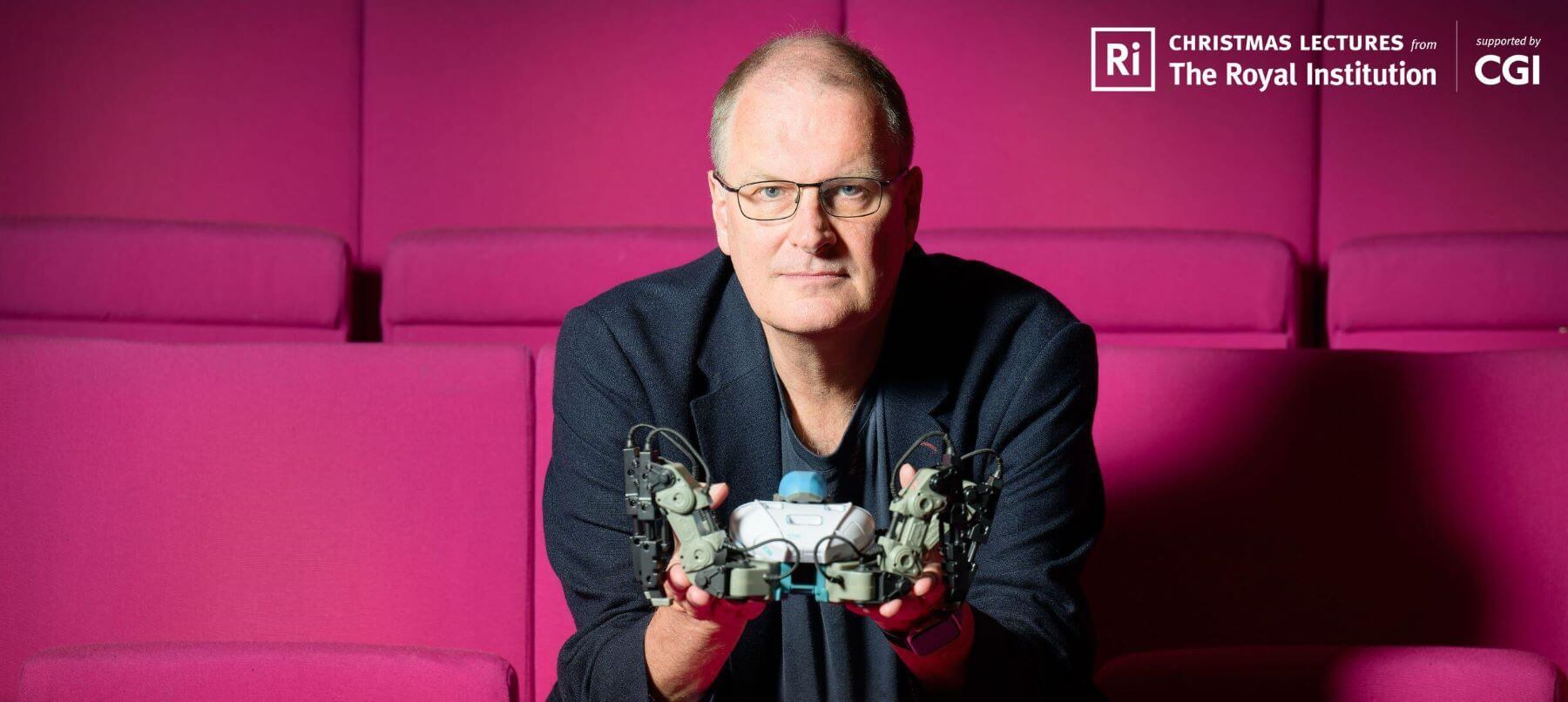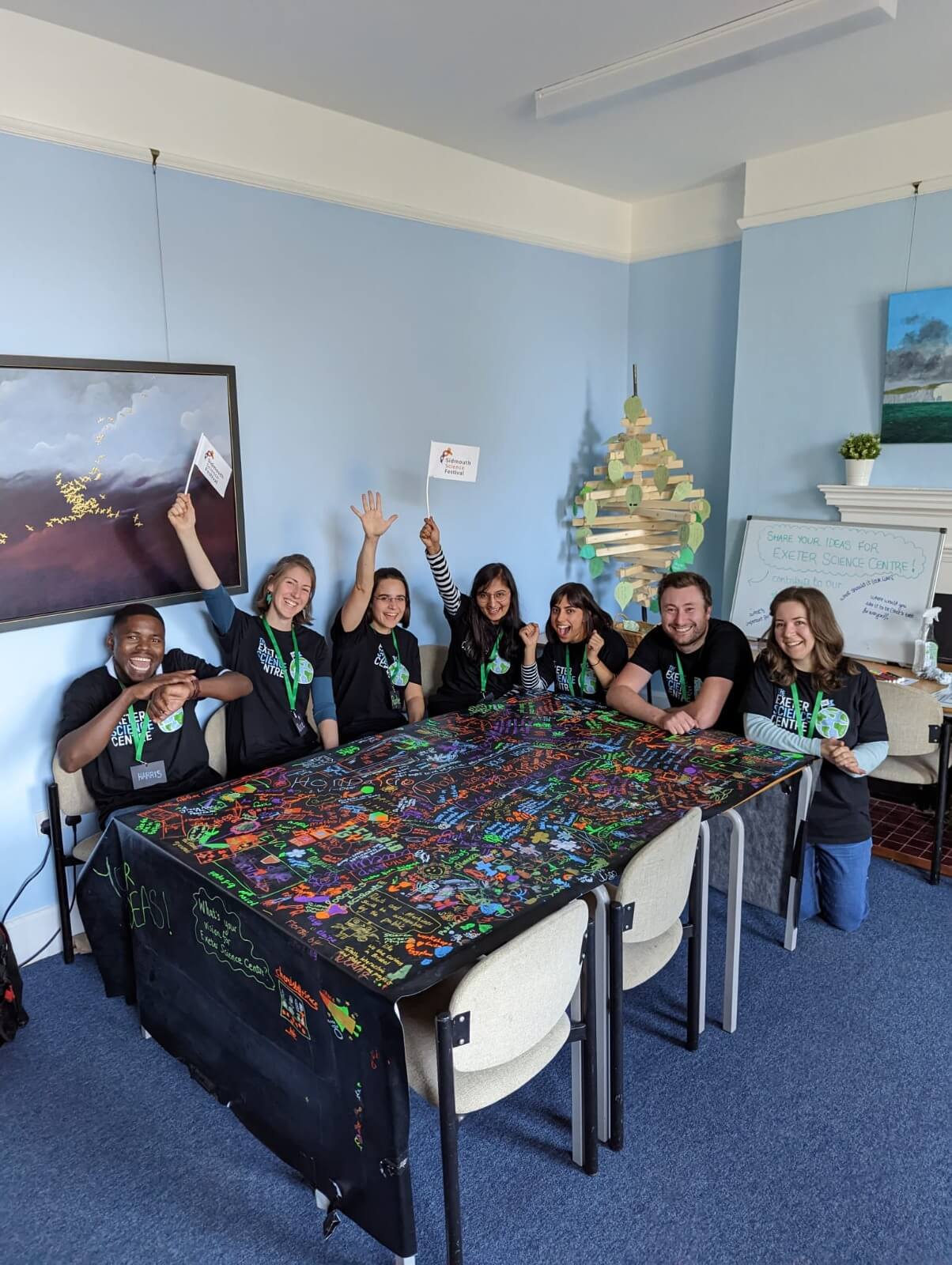News
Page
New Project: Livingwalls for NetZero
18th July 2024
We’re thrilled to have been awarded funding from the University of Plymouth’s Net Zero Solutions Fund for our new project: ‘Livingwalls for NetZero (LNZ): A live research and engagement project’.
This funding is supporting University of Plymouth researchers to work with us and Western GeoBuild (the living wall contractors) to design, monitor and engage the public with a living wall on the Melo Cafe, below our new office!
We are determined that the science centre buildings that we create are good for both people and planet – and we have always intended to cover them with green walls (living walls) which formed a live research project. The Lumi and Melo team were keen to improve the aesthetics of their building with a living wall, so this is the ideal opportunity to investigate and highlight the benefits of living walls while we don’t have a building of our own yet!
The focus will be on optimal green wall plant and soil choice for carbon sequestration and insulation properties, longevity, and also the wider benefits for biodiversity, sound reduction, wellbeing and flood-risk reduction, some of which may be investigated via student projects. We’re particularly excited to be using locally-sourced plants and growth medium, which will include biochar for added nutrient, water retention and carbon sequestering benefits.
We’re aiming to install the living wall in early September. In the meantime, we’re collecting data to compare to when the living wall is in place, and planning our public engagement activities. Watch this space!
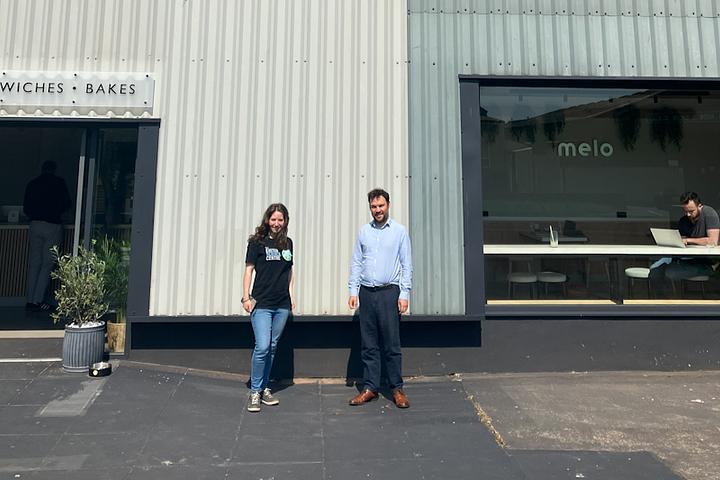
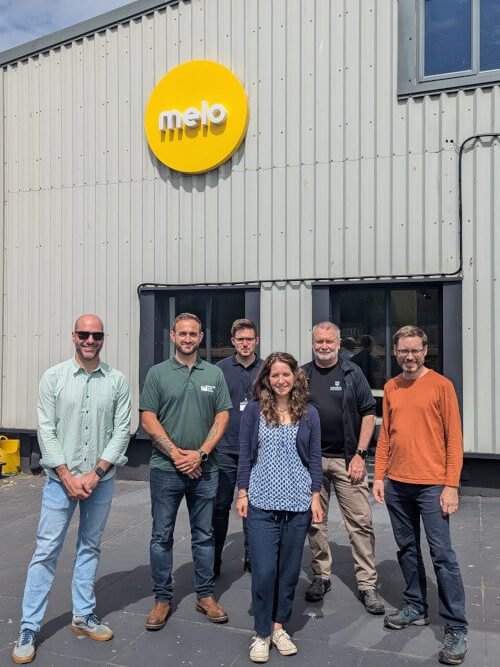
ESC support package from Lumi Therapy
26th April 2024
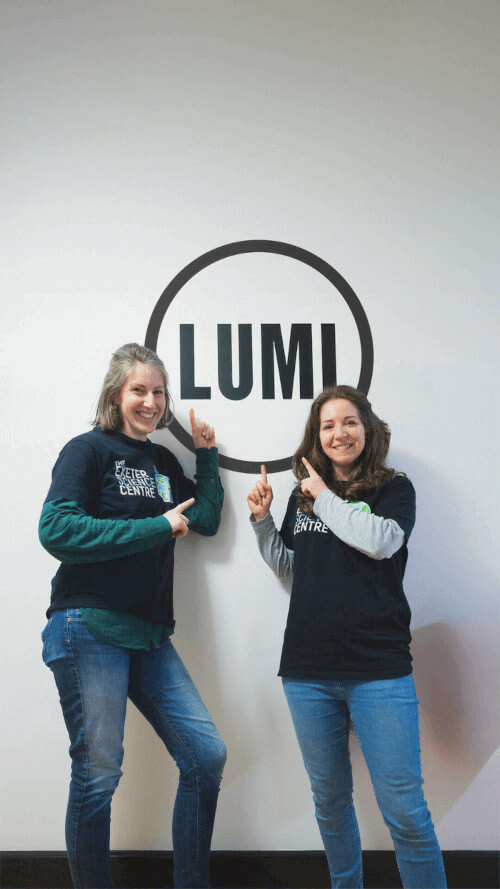
We are so grateful to Lumi Therapy for providing an incredibly generous support package to help us grow over the coming year.
Lumi, the wellness brand based in Marsh Barton, Exeter, has provided us with an unrestricted donation of £70,508, funding our website update as well as providing office and storage space. We are overwhelmed to receive this level of support, and this is a much-needed boost to help get us off the ground in the coming year!
We are at a real turning point for our organisation in 2024: our project work has demonstrated what we can do and the impact it can have, as well as highlighting the huge demand for science engagement opportunities in the region. However, with much of our funding so far being small-scale projects (typically between £1-10k) we have not had the time nor resources to grow our team and expand our operations, to get to a sustainable scale. In addition, we have a number of potential projects and partnerships on the horizon, including the development of the physical buildings, and running community-led projects on tackling the local effects of global issues, which we intend to be a long-term component of our community engagement work. These innovative projects take time to develop and apply for, and we have not yet had the capacity to pursue these opportunities.
This injection of funding will be game-changing for us: first, it’s enabling us to increase the Directors’ pay to the median salary in the region from the Real Living Wage, so then we can take on staff at competitive salary levels. Next, it’s providing the financial buffer to take on these staff roles, which can then be sustained long-term through funded projects, that we will now have the time to take on.
We can’t thank Lumi enough for supporting us, and we’re really looking forward to working with them to develop the living wall on the front of their building! Stay tuned on our social media and newsletters for updates on this project as well as our upcoming staff vacancies.
Our new registered office address is 1 Marsh Green Road, Marsh Barton Trading Estate, Exeter, EX2 8NY – we don’t (yet!) have a space for public visitors though, so please email us for any enquiries. We’re really grateful to Kaleider for providing our previous registered office address, since first registering as a CIC in 2020!
Citizen Phage Library publication
20th February 2024
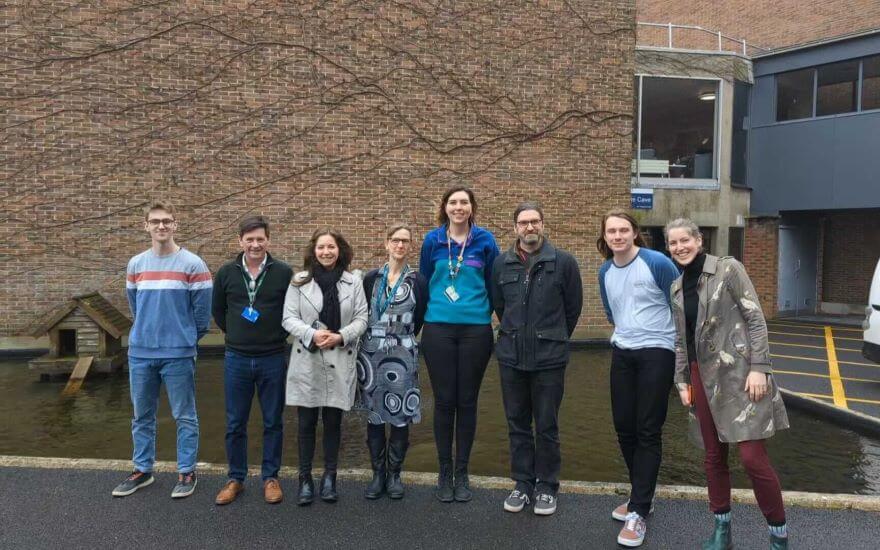
We are thrilled to be co-authors on a recent publication about the Citizen Phage Library (CPL)! We worked with the academic team from the University of Exeter on engaging Citizen Phage Hunters with the project from 2021-2022, and you can find out more on our project resource page. Hopefully this paper will inspire other groups around the world to develop similar programs!
The paper, published in the journal Microorganisms, describes this important work in tackling antibiotic resistance through the power of citizen science. The scientists screened water samples from citizens and wastewater from the Environment Agency with a rapid turnaround. Despite their small lab team, they were able to isolate over 160 potential phages for each strain within five days, sequence an optimised selection within 14 days and select final phages for use in cocktails within 20 days – check out our video lab tour to understand this process.
Antimicrobial resistance is considered as one of the top global public health and development threats, and the work of the CPL could be a really crucial solution. Phages are routinely used in Eastern Europe, and one of the challenges now is to work with regulators and clinicians to get the regulatory framework in place, along with the facilities and safe clinical procedures, so that phages could be used in routine treatments in the UK and Western Europe. The Citizen Phage Library could be an important ‘biobank’ to identify, store and supply phages for patients in the UK, Europe and worldwide – and the CPL team have already supplied phages from the Library to be used in Australia, the US and Canada.
There are now well over 1000 phages in the Citizen Phage Library, and we’re so grateful to all the Citizen Phage Hunters who have contributed so far! We really hope to continue supporting this important project, and fingers crossed the CPL will secure funding to expand their operations.
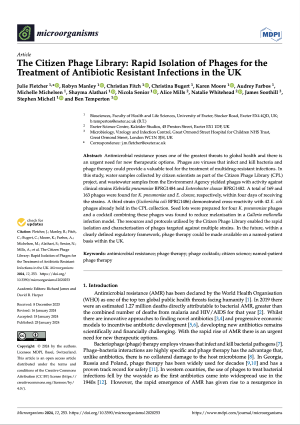

Phages discovered in the River Exe
As part of the project, Natalie and Alice did some water sampling and found 3 phages in the River Exe by the flood relief channel, Exeter Quay and the Exeter Ship Canal, and these phages are now part of the Citizen Phage Library! They’ve affectionately been named ExeSciCentre, ExeQuayColi, and EXEpedition – and you can see ExeQuayColi doing its thing against E. coli in a petri dish – we are very proud phage parents!

British Science Festival Community Grants Partner: blog post of our reflections
30th January 2024
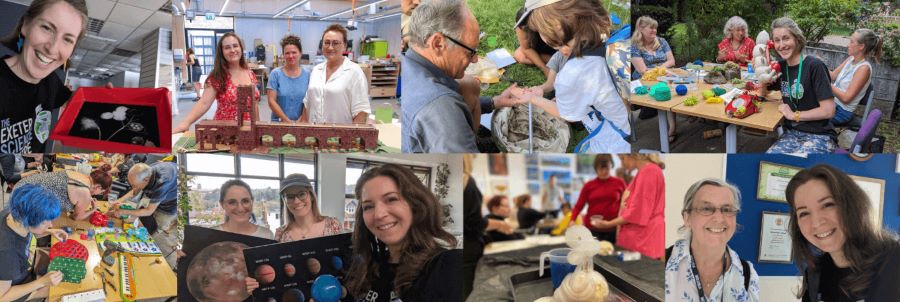
We were delighted to facilitate the British Science Festival Community Grants when this national festival came to Exeter in 2023! In our blog post for the British Science Association, we’ve shared our reflections of this experience, and how it will shape our ongoing work with communities and organisations in the region.
We are so grateful for our core costs funding from the Postcode Local Trust, which enabled us to dedicate our time to this unique project: building new connections with community organisations, and supporting how they engaged their communities with science in meaningful ways. We worked with some really inspiring groups, and we are determined to maintain and build on these connections in future.
Community engagement and empowerment is an important part of what we do: over the past year, as well as being the BSF Community Partner, we’ve collaborated with underserved & underrepresented groups for our Climate Exhibition 2023 and participated in the Mindsets + Missions cohort – we’ve learnt so much through these experiences, and we can’t wait to grow our team and capabilities so we can reach more people, more regularly.
We’re approaching the end of our third year as a charity at the moment, so we’re revisiting our business plan and are working to articulate all the things we want to do and how we intend to do it (this is not an easy task – we have so many ideas!). But our end goal, and our reason for being, has never been clearer – we express this in our final reflections in the blog post, which we’ve copied below:
“A lasting benefit of this experience for us is a deeper understanding of community action in the city where we are establishing ourselves. We aim to create a bold new amalgamation of educational charity, community organisation, cultural hub and tourist attraction, with the aim of reaching people from a wide range of ages and backgrounds. Our ultimate aim is to empower people to make a difference in the world, and we strongly believe that we need to work together to do this, building a collaborative ecosystem of the public, researchers, industry and organisations working for a better future. By helping to facilitate the community grants scheme, we had a taster of the work and needs of just a small sample of the brilliant organisations operating in our local area. This has reinforced our desire to better connect everyone, as part of the ecosystem that we’re trying to create in the city and region.“
Our blog post for the British Science Association
Stay tuned for more updates on how our organisation develops over the coming months. In the meantime, find out how you can support our work here!

ESC announces its first patron!
30th November 2023

Image credit: © Guy Reece
We are absolutely delighted to announce that George Monbiot — author, broadcaster and academic — is now Exeter Science Centre’s patron.
We greatly admire his drive to encourage people to work towards a positive future; this really resonates with our mission, and we build this into everything we do.
George’s far-reaching career has had a strong thread of science running through it, starting from his degree in Zoology from the University of Oxford and his time producing environmental radio programmes in the BBC Natural History Unit.
More recently, George helped to found the charity Rewilding Britain, he is an honorary fellow at Wolfson College at the University of Oxford, he is on the board of EAT, the scientific forum that seeks ways of transforming the global food system, and has written many books and articles, and produced TED Talks, films and videos relating to the science of global issues (amongst many other topics), particularly climate change, rewilding and food systems. His latest book, ‘Regenesis: Feeding the World Without Devouring the Planet’ draws on astonishing advances in soil ecology to explore pioneering ways to grow more food with less farming.
George has received many accolades for his work including the UN Global 500 for outstanding environmental achievement in 1995, and the Orwell Prize for Journalism in 2022.
We are hugely inspired by George’s work, and his tireless efforts to highlight global issues and help people to understand, care about and work towards tackling them. We are incredibly grateful for his support.
RI Christmas Lectures Livestream 2023
11th September 2023
Update: Unfortunately due to the sad closure of Maketank on Paris Street, plus the lack of funds for a suitable venue and our current limited time resources, we will no longer be running a livestreaming event for the RI Christmas Lectures in 2023. However, we hope to do so next year: stay tuned!
Other venues in the South West include the University of Plymouth, keep an eye on the RI webpage for more details! As usual, you can also watch the lectures when they’re broadcast on TV over the Christmas period.
This year’s lecturer, Prof Mike Wooldridge from the University of Oxford, will be speaking on “The Truth About AI” – this is such an important topic, and we had really interesting discussions with two local experts AI and ChatGPT recently – check those out below:
Exeter Science Centre and University of Exeter Sign Memorandum of Understanding
5th July 2023
We are delighted to have signed a Memorandum of Understanding (MOU) with the University of Exeter, to further our shared ambitions to make a difference in Exeter and the wider region.
We have worked with the University of Exeter in many of our projects and events, and are grateful for the support of the academic staff on our trustee board. We are thrilled to formalise this partnership and support each other’s goals to create a positive future through education and bridging the gap between research, industry and the public.
As part of this partnership, the Deputy Vice Chancellor for Business Engagement and Innovation, Stuart Brocklehurst, will Chair our new Strategic Advisory Board, which has a particular focus on creating the science centre building as well as guiding our organisation’s overall trajectory.
Read this full news story on the University of Exeter News page, and stay tuned for more details on the Strategic Advisory Board!
ESC joins the ‘Our World from Space’ programme!
15th June 2023
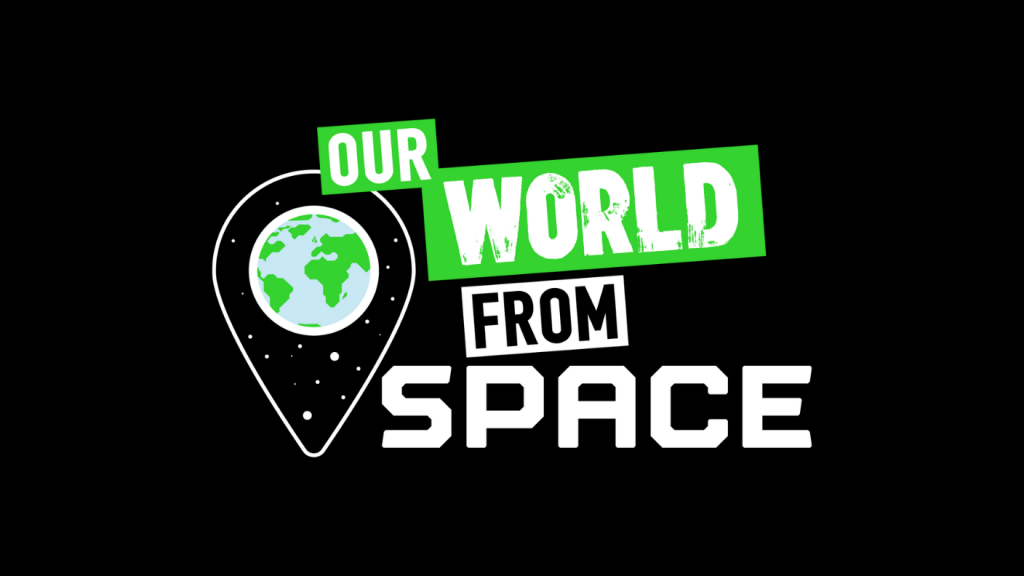
We’re delighted to have been selected as one of 22 science centres across the UK to join the Our World from Space programme! Our programme will commence in November, following on from our Operation Earth + We Are Guardians tour. If you’re a South-West based researcher or industry professional working with satellite data / in the space industry, check out our call for participants below!
This exciting 2-year national programme, created and developed by the Association for Science and Discovery Centres (ASDC) and a specialist project team, will be exploring the relevance of UK space science for the future health and sustainability of our home planet. ‘Our World From Space’ leverages current learning and connections from two previous ASDC science engagement programmes, Destination Space and Operation Earth, with new content and hands-on activities for the regional science centres and museums to deliver.
We will be running a variety of interactive events across the South West in our signature “pop-up” format. From November 2023-2024, we will be reaching young people, families and the wider public by running workshops and events in schools, community hubs, museums, libraries and festivals, with a particular focus on disadvantaged communities.
Find out more and discover the science centres and museums running the ‘Our World From Space’ programme on the ASDC website. ‘Our World From Space’ is funded by UK Space Agency in partnership with Natural Environment Research Council (NERC), part of UK Research and Innovation.
Check out our project resources and updates on the Our World From Space project page.
South West Research + Industry: call for participants
We have a call-out for South West-based researchers and industry professionals to take part: either by sharing their work, volunteering to engage with the public at their events, or both!
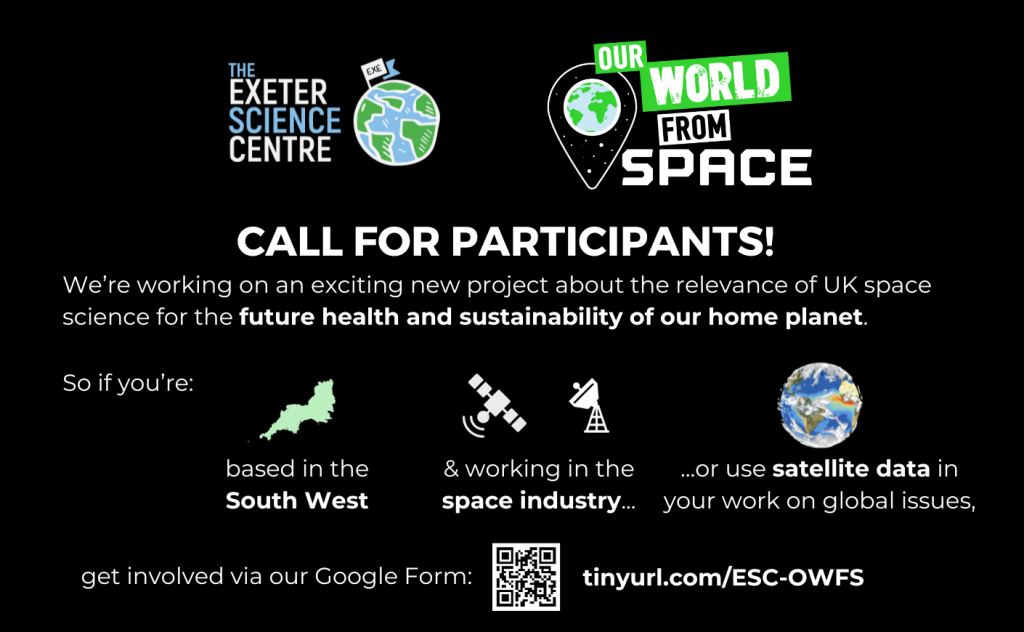
Timescales and more detail:
We will be delivering school workshops and public activities across 2024, similar to the Operation Earth project we have just completed.
Currently, we are identifying work in the region that they can highlight, and are planning to fit these into a narrative of ‘how the space industry + satellites can help us understand and tackle global issues’, and develop hands-on activities, demonstrations and images to help to explain the related concepts. Take a look at our recent Climate Exhibition 2023 to get an idea of the level of detail we’re aiming for.
Get involved:
Please fill in this Google form and share with your contacts!
If you have any opportunities to run citizen science projects, or have funding that could contribute to this work, we would love to hear from you – we are currently fundraising to make this a really significant project and reach thousands of people in the region, any additional funding through research grants or otherwise would be gratefully received.
Operation Earth + We Are Guardians Tour
31st May 2023
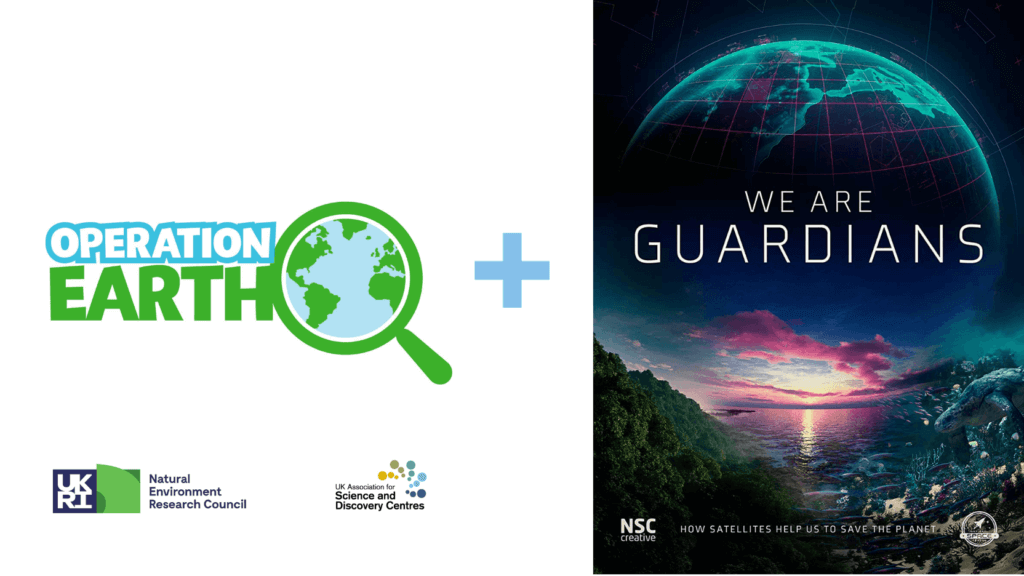
We are delighted to have the opportunity to tour an environment-themed science show, hands-on activities and VR experience to schools and community events this year! This programme has been generously funded by the Adrian Swire Charitable Trust, we’re so grateful for their support.
This tour combines two programmes of work, aimed at children and their families, that we have previously trialled through pop-up events:
- The award-winning We Are Guardians film developed by NSC Creative, that we are working with The Virtual Reality Visitor Experience to show in VR headsets.
- Our existing Operation Earth programme: a fantastic set of resources and kit developed by the Natural Environment Research Council and the Association for Science and Discovery Centres.
Through this project, we’re highlighting how we study and understand the natural environment, and our role in protecting and regenerating it. We’ll be delivering these events with some of our amazing volunteers who are local experts working and studying in the natural sciences field.
We’re excited to get started – check out our events page for upcoming public events, all of which will be free to attend!
Joining the Positive Tipping Points Community of Practice
20th March 2023
We’re delighted to have been accepted into the Positive Tipping Points Community of Practice run by the University of Exeter’s Green Futures Network. Alongside 15 other individuals and organisations across the world, we’ve joined this group to learn and share ideas on how to put the Positive Tipping Points Framework into practice.
What are Positive Tipping Points, we hear you cry? The climate is a complicated system and sometimes very sensitive to small changes. A little nudge in the right direction could lead to a really big positive difference. These nudges could be anything from more people using electric cars to the regeneration of tropical rainforests. Small acts can collectively make a big difference. Here’s scientist Prof. Tim Lenton from the University of Exeter describing it in a bit more detail.
Page
